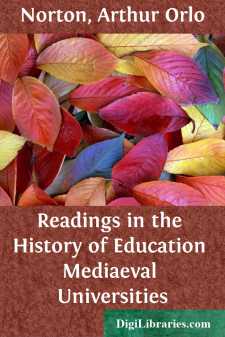Categories
- Antiques & Collectibles 13
- Architecture 36
- Art 48
- Bibles 22
- Biography & Autobiography 813
- Body, Mind & Spirit 142
- Business & Economics 28
- Children's Books 13
- Children's Fiction 10
- Computers 4
- Cooking 94
- Crafts & Hobbies 4
- Drama 346
- Education 46
- Family & Relationships 57
- Fiction 11828
- Games 19
- Gardening 17
- Health & Fitness 34
- History 1377
- House & Home 1
- Humor 147
- Juvenile Fiction 1873
- Juvenile Nonfiction 202
- Language Arts & Disciplines 88
- Law 16
- Literary Collections 686
- Literary Criticism 179
- Mathematics 13
- Medical 41
- Music 40
- Nature 179
- Non-Classifiable 1768
- Performing Arts 7
- Periodicals 1453
- Philosophy 64
- Photography 2
- Poetry 896
- Political Science 203
- Psychology 42
- Reference 154
- Religion 513
- Science 126
- Self-Help 84
- Social Science 81
- Sports & Recreation 34
- Study Aids 3
- Technology & Engineering 59
- Transportation 23
- Travel 463
- True Crime 29
Readings in the History of Education Mediaeval Universities
Description:
Excerpt
I
INTRODUCTION
The history of education, like all other branches of history, is based upon documents. Historical documents are, in general, "the traces which have been left by the thoughts and actions of men of former times"; the term commonly refers to the original records or sources from which our knowledge of historical facts is derived. The documents most generally used by historians are written or printed. In the history of education alone these are of the greatest variety; as is shown in the following pages, among them are university charters, proceedings, regulations, lectures, text-books, the statutes of student organizations, personal letters, autobiographies, contemporary accounts of university life, and laws made by civil or ecclesiastical authorities to regulate university affairs. Similar varieties of records exist for other educational institutions and activities. The immense masses of such written or printed materials produced to-day, even to the copy-book of the primary school and the student's note-book of college lectures, will, if they survive, become documents for the future historian of education.
The known sources for the history of education in western Europe since the twelfth century—to go no further afield—are exceedingly numerous, and widely spread among various public and private collections; the labor of a lifetime would hardly suffice to examine them all critically. Nevertheless many printed and written documents have been collected, edited, and published in their original languages; and in some instances the collections are fairly complete, or at least fairly representative of the documents in existence. Assuming that they are accurate copies of the original records, many are now easily accessible to students of the subject, since these reproductions may be owned by all large libraries.
These records, rightly apprehended, have far more than a mere antiquarian interest. The history of mediaeval universities is profoundly important, not only for students, but also for administrators, of modern higher education. For to a surprising degree the daily and hourly conduct of university affairs of the twentieth century is influenced by what universities did six centuries ago. On this point the words of Mr. Hastings Rashdall, a leading authority on mediaeval universities, are instructive: "… If we would completely understand the meaning of offices, titles, ceremonies, organizations preserved in the most modern, most practical, most unpicturesque of the institutions which now bear the name of 'University,' we must go back to the earliest days of the earliest Universities that ever existed, and trace the history of their chief successors through the seven centuries that intervene between the rise of Bologna or Paris, and the foundation of the new University of Strassburg in Germany, or of the Victoria University in England."
Knowledge of the subject should, however, yield much more than understanding: it should also influence the practical attitudes of those who are concerned with university affairs....


